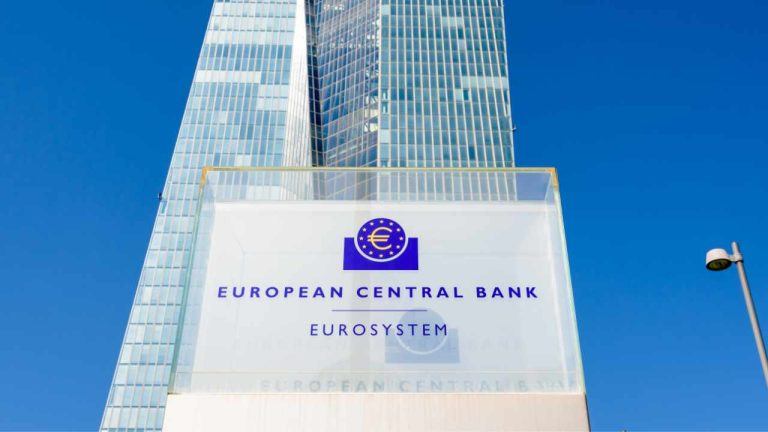 On July 25, 2024, Slovenia issued its first digital bond, marking a significant milestone as the first EU sovereign and one of the earliest worldwide to do so. The bond issuance occurred under the European Central Bank’s (ECB) wholesale central bank money settlement experimentation program. The settlement was executed on-chain in wholesale central bank digital […]
On July 25, 2024, Slovenia issued its first digital bond, marking a significant milestone as the first EU sovereign and one of the earliest worldwide to do so. The bond issuance occurred under the European Central Bank’s (ECB) wholesale central bank money settlement experimentation program. The settlement was executed on-chain in wholesale central bank digital […] The European Central Bank (ECB) maintained its interest rates on Thursday, indicating that domestic price pressures and elevated inflation levels will persist into next year. After a recent rate cut, the ECB adopted a cautious stance, suggesting more evidence is needed before making another move. The ECB highlighted that while corporate profits are mitigating some […]
The European Central Bank (ECB) maintained its interest rates on Thursday, indicating that domestic price pressures and elevated inflation levels will persist into next year. After a recent rate cut, the ECB adopted a cautious stance, suggesting more evidence is needed before making another move. The ECB highlighted that while corporate profits are mitigating some […]

The central bank has been experimenting with multiparty computation, which could support the entire European economy in the future.
Central banks worldwide are increasingly exploring blockchain technology adoption, with the European Central Bank (ECB) being the latest example.
The ECB recently completed a blockchain experiment for its central bank digital currency (CBDC) with Zama, according to the firm's chief academic officer, Nigel Smart.
He said during a panel discussion at FHE Summit 2024:
 The European Central Bank (ECB) has published its first progress report on the digital euro preparation phase, highlighting key design features and ongoing developments. The report emphasizes high privacy standards for both online and offline payments, aiming to provide users with a cash-like level of privacy. First Progress Report on the Digital Euro Preparation Phase […]
The European Central Bank (ECB) has published its first progress report on the digital euro preparation phase, highlighting key design features and ongoing developments. The report emphasizes high privacy standards for both online and offline payments, aiming to provide users with a cash-like level of privacy. First Progress Report on the Digital Euro Preparation Phase […] The president of Germany’s central bank has highlighted the ongoing debate about the holding limit for the digital euro, Europe’s central bank digital currency (CBDC). He noted that recent Bundesbank research indicates that the optimal amount could be in the range of 1,500 to 2,500 digital euros per person. ‘The Jury Is Still Out Here’ […]
The president of Germany’s central bank has highlighted the ongoing debate about the holding limit for the digital euro, Europe’s central bank digital currency (CBDC). He noted that recent Bundesbank research indicates that the optimal amount could be in the range of 1,500 to 2,500 digital euros per person. ‘The Jury Is Still Out Here’ […] Joachim Nagel, President of the Deutsche Bundesbank and Member of the Governing Council of the European Central Bank (ECB), has raised concerns about central banks’ business model. “If part of your core product is loosening attractiveness then you have to think about another new core product,” he stressed. ‘We Need to Speed up on All […]
Joachim Nagel, President of the Deutsche Bundesbank and Member of the Governing Council of the European Central Bank (ECB), has raised concerns about central banks’ business model. “If part of your core product is loosening attractiveness then you have to think about another new core product,” he stressed. ‘We Need to Speed up on All […]

Bundesbank’s president Joachim Nagel urged central banks to revamp their business models and adopt digital currencies during the BIS Innovation Summit.
Central banks’ future depends on a revision of their business model and speedy adoption of central bank digital currencies (CBDCs), said Joachim Nagel, president of the Bundesbank and member of the European Central Bank (ECB).
Nagel reportedly warned about the uncertainty surrounding central banks during a panel session at the Innovation Summit hosted by the Bank for International Settlements on May 6.
“If you would have asked me 20 years ago if the central bank business model” was “destroyable or not, I would have said no,” he reportedly stated in Basel, Switzerland. Nagel continued:

The Deutsche Bundesbank is the fourth central monetary authority to conduct research in conjunction with MIT’s Digital Currency Initiative.
The Deutsche Bundesbank is the latest monetary authority to team up with the Massachusetts Institute of Technology (MIT) Digital Currency Initiative (DCI) to study central bank digital currency (CBDC). President of the German central bank Joachim Nagel spoke at the launch of the project about challenges ahead for the digital euro.
Nagel told MIT students that the joint research will focus on designing security and privacy measures in a CBDC. The problem is that private digital payment solutions often use third-party services that gain access to consumers’ payment data, which they can use for commercial purposes. In contrast:
Nagel went on the say the current payments system does not work well. “German bank cards, for example, don’t always work in other euro area countries, even if they contain a payment scheme operated by an international company,” he said.
 The European Central Bank (ECB) has published a blog post claiming that “bitcoin has failed to fulfill its original promise to become a global decentralized digital currency.” The ECB economists who authored the post added that bitcoin’s fair value is still zero and bitcoin transactions are “still inconvenient, slow, and costly.” Moreover, they asserted that […]
The European Central Bank (ECB) has published a blog post claiming that “bitcoin has failed to fulfill its original promise to become a global decentralized digital currency.” The ECB economists who authored the post added that bitcoin’s fair value is still zero and bitcoin transactions are “still inconvenient, slow, and costly.” Moreover, they asserted that […]
Officials of the European Central Bank (ECB) are not convinced that Bitcoin (BTC) is a valuable financial asset despite the US approval of a spot exchange-traded fund (ETF) for the flagship cryptocurrency. The ECB is the central bank of European Union (EU) countries that use the euro as their currency. In a new blog post, […]
The post European Central Bank Officials Blast Bitcoin, Say Fair Value of BTC Is ‘Still Zero’ Even After US ETF Approval appeared first on The Daily Hodl.